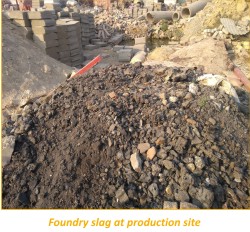Foundry Industrial Waste
as Building Material
The
developing nations including Asia have been experiencing very high growth in
urbanisation and industrialisation which has resulted in increasing amount
of waste generation. The major challenge faced in most of the Asian
countries in the area of waste management is sustainable and profitable
reuse.
In India, waste management is mainly governed by
the Ministry of Environment, Forest and Climate Change (MoEF) who works
together with State Pollution Control Boards of various states.

Foundry slag waste
Foundry slag is a non-metallic inert by-product produced during casting of iron and steel in foundry units. Silicate and aluminate impurities from the ore and coke are combined in the furnace with a flux (limestone, dolomite etc).
Slag is one of the prime residues in the foundry industry that is produced during metal castings process. Metals are cast into shapes by melting them into a liquid, pouring the metal into mold, and removing the mold material after the metal has solidified as it cools.
The various foundry technologies that produce
two types of slag are:
• Cupola technology - air cooled slag and water quenched slag
• Induction furnace - air cooled slag
• Rotary kilns - air cooled slag
Rotary kilns have been almost phased out and
only remains in small numbers in isolated places.
Air cooled slag is generated by releasing hot waste slag into open air for
slow cooling. Air cooled slag has high density, low porosity and is mildly
reactive. It has high crushing and impact strength due to which they can be
used as replacement of natural aggregates.
Water quenched slag is formed by releasing hot slag into water for quick cooling. This step decreases its density, increases porosity and reactivity. It also possesses properties of low crushing and low impact strength due to which strength of final product decreases.
Presently all type of waste slag is dumped wherever space is found without any compliance of the regulation due to non-availability of specific disposal sites and enforcement of regulations. It leads to occupation of farm land and poses serious pollution impact to the environment and the soil. Disposal of large quantities of slag becomes a substantial environmental concern and a critical issue for foundry industries. Improving the slag utilisation in a profitable manner is an important way to resolve these problems.
Foundry waste slag application as an alternative building material
Development Alternatives has developed a methodology for 100% replacement of coarse natural aggregates by foundry slag-based aggregates in various non-structural concrete products. Application research work has been initiated to look into the feasibility of slag utilisation as the secondary resource and the samples were collected from various foundry clusters from Punjab and Haryana.
Pilot scale plant has also been set up at Datia,
Madhya Pradesh for training and skill development. Various other
non-structural building material products (e.g. micro concrete roofing
tiles, RCC door and window frames, kerb stones, hollow concrete blocks,
concrete tiles, grass pavers etc.) with waste slag have also been
established.
Commercial technology package to manufacturer pavers block using waste
foundry slag have been transferred to 25 numbers of enterprises mostly
situated in Punjab, Haryana and UP.
■
Pramod Kumar
pkumar@devalt.org